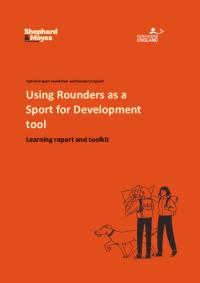A research library of key reports on the sports and physical activity sector from a variety of sources.
About This Report:
Road to Evidence. A systematic and comparative analysis
Laureus Sport for Good and the Commonwealth Secretariat are both committed stakeholders in the Sport for Development (SfD) field, which uses sports-based programming to tackle key social issues. • If practitioners, researchers, and policy makers agree to prioritise rigorous, appropriate (and relatable) methodologies when researching or evaluating SfD interventions, there is the potential to improve the quality of evidence in the field. • There is no evidence that SfD is more impactful in one part of the world than another (i.e. developed vs developing economies), and there is no difference in the strength of evidence offered across the different settings. On the other hand, it is important for all stakeholders not to presume that what works in one social, cultural, or geographic area, or with one SfD organisation, will necessarily work in another. • The environmental context in which SfD and non-sport youth development interventions take place was rarely analysed in detail, with the focus instead on the intervention itself. More research needs to be conducted that is contextualised within the social and political climate of the interventions. Critical factors for success or failure, and potential explanatory variables, including common challenges, should be front of mind when planning programmatic delivery and study of impact. These factors directly and tangibly affect programme efficacy: • Explanatory variables: (e.g. programme climate; policy landscape; relationships; programme design and implementation; programme leadership; participant access to opportunities). • Common challenges: (e.g. lack of resources; insecure housing; inadequate staff training; familial responsibilities). • It is important to consider stakeholder impact on SfD efficacy in greater detail, and go beyond assessing perceptions of participant outcomes only. Including stakeholders such as parents and community members, partner organisations, officials and policy makers in programme evaluation will lead to a greater understanding about the efficacy and effects of SfD programming. 3 Summary 4 Play-by-Play Before We Took the Field: Background and Reasons for the Research Game Plan: Research Methodology Reel Review: Major Learning Points and Recommendations 6 SfD Impact 6 Quality of Evidence: Strengths and Potential Critical Factors 7 The Stakeholder Effect 10 Implications and Recommendations // Summary 2 3 // Contents SPORT FOR DEVELOPMENT A SYSTEMATIC REVIEW & COMPARATIVE ANALYSIS In recent years, a number of organisations – from funders and delivery organisations to academic institutions and intergovernmental bodies – have invested time and resource to assess the impact of this approach as compared to other methodologies. Seeking to better understand the evidence base created by this, we worked with leading researchers to compare the impact of SfD and nonsport youth development interventions on four specific social concerns: community cohesion; education; employment; health and wellbeing. We chose a group of six cities – London, Nairobi, New Orleans, Cape Town, Hong Kong and Mumbai – split across the continents and across developed and developing economies, in which we knew (a) that large numbers of SfD organisations were operating with a focus on those social concerns, and (b) that research had been conducted, and we worked to examine the state of the evidence and the methodologies used to capture it.










